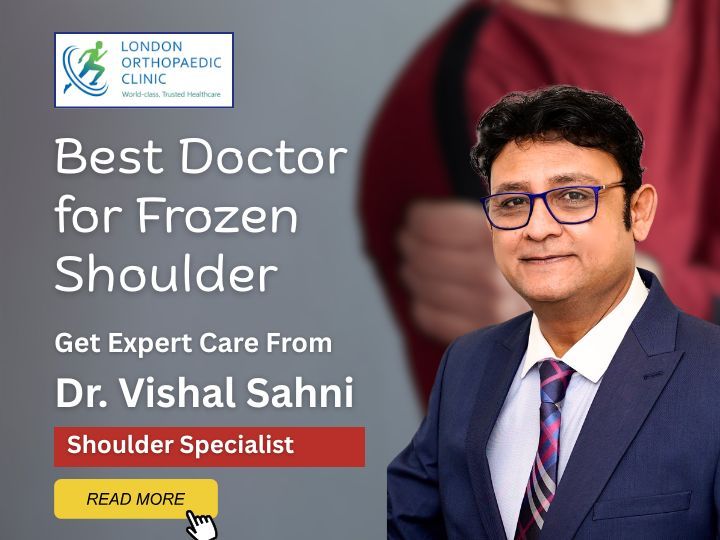
Recovering from shoulder surgery is not only about rest, physiotherapy, and medical care—it is also about the right nutrition. The food you eat plays a direct role in how your body heals, how fast your wounds close, and how quickly you regain strength in your shoulder. At London Orthopaedic Clinic, Nagpur, under the expert guidance of Dr. Vishal Sahni, an experienced Orthopaedic Surgeon specialising in Shoulder, Elbow and Wrist treatments, we always advise patients to follow a carefully chosen diet after surgery.
If you have undergone a shoulder replacement, rotator cuff repair, fracture fixation, or ligament surgery, your body is working hard to heal tissues, rebuild muscles, and restore joint strength. The right diet gives your body the tools it needs for healing. On the other hand, the wrong food can slow down recovery, increase inflammation, and make pain worse.
In this article, we will explain in detail:
- The best types of food to eat after shoulder surgery.
- The nutrients that speed up recovery.
- What you should avoid eating to prevent complications.
- Practical tips for a balanced post-surgery diet.
Why Diet Matters After Shoulder Surgery
After surgery, your body is in a state of repair. Tissues around the shoulder are healing, blood supply is increasing to the area, and your immune system is actively working to fight infection. Good nutrition supports this natural healing process in several ways:
- Protein helps repair muscles and tissues.
- Vitamins and minerals boost immunity and bone health.
- Anti-inflammatory foods reduce swelling and pain.
- Proper hydration improves circulation and healing.
- Balanced diet prevents weight gain during restricted physical activity.
Without the right diet, healing slows down, pain may last longer, and the risk of complications increases.
Best Diet After Shoulder Surgery
1. Protein-Rich Foods for Muscle and Tissue Repair
Protein is the building block of healing. After shoulder surgery, your muscles and tendons need protein to recover strength. Eating enough protein helps wounds close faster and prevents muscle loss due to rest and limited movement.
Good protein sources include:
- Lean chicken, fish, or eggs.
- Paneer, curd, and milk for vegetarians.
- Pulses, dals, soybeans, chickpeas, and nuts.
- Protein-rich grains like quinoa or millets.
A diet with small portions of protein at every meal works better than taking a large amount at once.
2. Foods Rich in Vitamin C for Faster Wound Healing
Vitamin C plays an important role in collagen production, which is essential for repairing ligaments, tendons, and skin after surgery. It also helps in reducing infection risk.
Best sources of Vitamin C:
- Citrus fruits like oranges, mosambi, and lemons.
- Guava, amla (Indian gooseberry), and papaya.
- Tomatoes, capsicum, and broccoli.
Including a Vitamin C-rich fruit in your daily diet can speed up recovery.
3. Calcium and Vitamin D for Bone Strength
If your surgery involves shoulder joint replacement, fracture fixation, or bone-related repair, calcium and Vitamin D are extremely important. They strengthen bones and improve joint stability.
Sources of Calcium:
- Milk, curd, paneer, and cheese.
- Ragi, sesame seeds, and almonds.
- Green leafy vegetables like spinach and methi.
Sources of Vitamin D:
- Early morning sunlight.
- Fortified foods like milk, cereals, and egg yolks.
- Fish like salmon or sardines.
Combining calcium with Vitamin D ensures better absorption and stronger bones.
4. Iron-Rich Foods for Better Energy and Recovery
Surgery often causes some blood loss, and patients may feel weak or tired afterwards. Iron helps build haemoglobin, which carries oxygen to healing tissues.
Iron-rich foods include:
- Spinach, beetroot, and garden cress seeds (Halim).
- Lentils, rajma, and chana.
- Dates, jaggery, and figs.
- For non-vegetarians: red meat, liver, and fish.
Pairing iron-rich foods with Vitamin C-rich fruits improves absorption.
5. Omega-3 Fatty Acids for Reducing Inflammation
Post-surgery, inflammation and swelling around the shoulder are common. Omega-3 fatty acids help control inflammation naturally, reducing pain and stiffness.
Sources of Omega-3 include:
- Flaxseeds, chia seeds, and walnuts.
- Fatty fish like salmon, tuna, and mackerel.
- Canola oil and soybean oil.
Adding a spoon of flaxseed powder to your meal or having walnuts as snacks can make a big difference.
6. Whole Grains and Fibre for Smooth Digestion
Painkillers and reduced activity after surgery can cause constipation. Fibre-rich foods help keep digestion smooth and prevent discomfort.
Good fibre sources include:
- Whole wheat chapati, brown rice, and oats.
- Fruits like apple, pear, banana, and papaya.
- Vegetables like beans, carrots, and cucumber.
Adequate fibre keeps the gut healthy and improves overall recovery.
7. Hydration – The Forgotten Part of Recovery
Water is as important as food. It helps transport nutrients, removes toxins, and supports healing. Patients who drink less water may face constipation, slow recovery, or fatigue.
Tips for staying hydrated:
- Drink 8–10 glasses of water daily.
- Include coconut water, buttermilk, and fresh soups.
- Avoid packaged juices and aerated drinks.
Foods to Avoid After Shoulder Surgery
Just as some foods help you heal, others can delay recovery or increase complications. Here are the main foods to avoid:
1. Deep-Fried and Junk Food
Fried foods, chips, and fast food are high in unhealthy fats and salt. They increase inflammation, slow wound healing, and can cause unnecessary weight gain during recovery.
2. Excess Sugar and Sweets
Refined sugar found in sweets, cakes, biscuits, and cold drinks weakens immunity and increases the risk of infection. Too much sugar also makes inflammation worse.
3. Excess Salt and Processed Foods
Pickles, packaged snacks, and processed foods contain too much salt, which causes water retention and swelling in the shoulder. Patients should reduce salt intake for better healing.
4. Red Meat in Large Quantities
While small amounts of lean meat are fine, excessive red meat increases inflammation and makes digestion difficult. Instead, choose lean chicken or fish.
5. Alcohol and Smoking
Alcohol slows down bone healing, reduces nutrient absorption, and increases infection risk. Smoking decreases blood circulation, making recovery much slower. Both should be avoided completely during recovery.
6. Too Much Caffeine
Tea and coffee in moderate amounts are fine, but excess caffeine causes dehydration, which is harmful during recovery. Energy drinks with caffeine should also be avoided.
Practical Diet Tips After Shoulder Surgery
- Eat small, frequent meals instead of heavy meals.
- Include colourful fruits and vegetables in every meal.
- Choose home-cooked food over restaurant or packaged food.
- Balance protein, fibre, vitamins, and healthy fats in your diet.
- Avoid skipping meals as it weakens recovery.
- Consult with your orthopaedic doctor or dietician for personalised advice.
Role of Dr. Vishal Sahni and London Orthopaedic Clinic in Post-Surgery Care
At London Orthopaedic Clinic, Dhantoli, Nagpur, Dr. Vishal Sahni and his team not only focus on advanced surgical treatments for Shoulder, Elbow, and Wrist problems but also guide patients in post-surgery recovery, including diet, physiotherapy, and lifestyle care. With over 24 years of experience in India and London, Dr. Sahni ensures that every patient receives complete recovery support.
Nutrition is not an afterthought—it is part of your healing journey. A well-planned diet can help you return to daily life faster, reduce pain naturally, and improve long-term shoulder health.
Conclusion
The best diet after shoulder surgery is rich in protein, vitamins, minerals, and anti-inflammatory foods, while avoiding junk, sugar, excess salt, alcohol, and smoking. Healing from surgery is not just about medical treatment; it is also about giving your body the right fuel to repair and rebuild.
If you are recovering from shoulder surgery or planning one, consult Dr. Vishal Sahni at London Orthopaedic Clinic, Nagpur, for expert care. Along with advanced surgical expertise, you will receive the right guidance for diet and recovery, helping you regain strength and mobility with confidence.
-
Which Doctor Is Best for Wrist Pain? Orthopedic vs Hand Specialist

Wrist pain is one of those problems many people ignore until daily activities become difficult. Simple tasks like holding a mobile phone, typing on a laptop, lifting a bag, riding a two-wheeler, or even doing pooja at home can suddenly feel painful and frustrating. For some, wrist pain starts suddenly after a fall or injury.…
-
When Should You See a Doctor for Golfer’s Elbow?

Expert Orthopaedic Guide by Dr. Vishal Sahni, London Orthopedic Clinic Nagpur Golfer’s elbow is a very common condition today, especially among people who use their hands and arms repeatedly in daily life. Despite the name, you don’t have to be a golfer to suffer from it. Many working professionals, homemakers, gym-goers, tennis players, and even…
-
Can You Suggest the Best Doctor for Frozen Shoulder Near Me? Expert Guide for Nagpur Patients

If you are searching online for “Can you suggest the best doctor for frozen shoulder near me?”, you are not alone. Frozen shoulder is one of the most common causes of long-lasting shoulder pain and stiffness, especially in adults between 40 to 65 years of age. Many patients in Nagpur and nearby areas often experience…